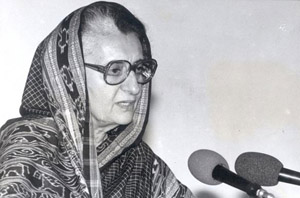New Delhi, Dec 11: The 1975 Emergency was perhaps an "avoidable event" and Congress and Indira Gandhi had to pay a heavy price for this "misadventure" as suspension of fundamental rights and political activity, large scale arrests and press censorship adversely affected people, says President Pranab Mukherjee.
A junior minister under Gandhi in those turbulent times, Mukherjee however, is also unsparing of the opposition then under the leadership of the late Jayaprakash Narayan, JP, whose movement appeared to him to be "directionless".
The President has penned his thoughts about the tumultuous period in India's post-independence history in his book "The Dramatic Decade: the Indira Gandhi Years" that has just been released.
He discloses that Indira Gandhi was not aware of the Constitutional provisions allowing for declaration of Emergency that was imposed in 1975 and it was Siddartha Shankar Ray who led her into the decision.
Ironically, it was Ray, then Chief Minister of West Bengal, who also took a sharp about-turn on the authorship of the Emergency before the Shah Commission that went into 'excesses' during that period and disowned that decision, according to Mukherjee.
Mukherjee, who celebrated his 79th birthday today, says,"The Dramatic Decade is the first of a trilogy; this book covers the period between 1969 and 1980...I intent to deal with the period between 1980 and 1998 in volume II, and the period between 1998 and 2012, which marked the end of my active political career, in volume III."
"At this point in the book, it will be sufficient to say here that many of us who were part of the Union Cabinet at that time (I was a junior minister) did not then understand its deep and far reaching impact."
Mukherjee's 321-page book covers various chapters including the liberation of Bangladesh, JP's offensive, the defeat in the 1977 elections, split in Congress and return to power in 1980 and after.
The President says there was no doubt that Emergency brought discipline in public life, a growing economy, controlled inflation, a reversed trade deficit for the first time, enhanced developmental expenditure and a crack down on tax evasion and smuggling but "it was perhaps an avoidable event".
"Suspension of fundamental rights and political activity (including trade union activity), large scale arrests of political leaders and activists, press censorship, and extending the life of legislatures by not conducting elections were some instances of Emergency adversely affecting the interests of the people. The Congress and Indira Gandhi had to pay a heavy price for this misadventure," says Mukherjee.
Recounting the dramatic moments leading to declaration of Emergency minutes before midnight of June 25, 1975, he says that it was the suggestion of Ray, then Chief Minister of West Bengal, and Indira Gandhi acted on it.
"Indira Gandhi told me subsequently that she was not even aware of the Constitutional provisions allowing for the declaration of a state of Emergency on grounds of internal disturbance particularly since a state of Emergency had already been proclaimed as a consequence of Indo-Pak conflict in 1971", he says.
Ray, then member of CWC and Central Parliamentary Board, was one of the "most influential advisors" of Indira Gandhi with his views being sought on diverse issues.
"Siddhartha Babu had considerable influence over the decision making process of the organisation and administration...In matters relating to West Bengal, he was the decisive voice. So it was not surprising that he was privy to considerable information...," the President said.
Interestingly, though not surprisingly, once it was declared, there were a whole host of people claiming authorship of idea of declaring the Emergency.
And, again not surprisingly, these very people took a sharp about-turn before the Shah Commission.
"Not only did they disown their involvement, they pinned all the blame on Indira Gandhi pleading their own innocence. Siddartha babu was no exception. Deposing before the Shah Commission, he ran into Indira Gandhi--draped in a crimson sari that day--in the Commission hall and tossed a sprightly remark: 'You look pretty today'.
'Despite your efforts,' retorted a curt Indira Gandhi.
Terming the Shah Commission proceedings as "peculiar", Mukherjee said,"Suffice it to say that it seemed that the Commission was collecting materials and information only to substantiate a pre-conceived conclusion."
Mukherjee recalled that a number of ministers and bureaucrats deposed before the Commission blaming Indira Gandhi "alone" for the imposition of the Emergency with the Cabinet not being taken into confidence.
Giving details of the testimony of the then Home Minister Kasu Bramhananda Reddy before the Commission, the President said Reddy told the panel that he was called by the Prime Minister at 10.30 PM and was told that on account of deteriorating law and order situation, it was necessary to impose an internal Emergency.
According to Reddy, he told the Prime Minister that the powers already available under the existing Emergency could be availed of to deal with the situation but was overruled by Indira Gandhi saying internal Emergency was "considered necessary."
"Bramhananda Reddy told the Commission that he then signed a letter to the President of the Republic and appended the draft proclamation of Emergency for the President's assent with this letter. The Letter signed by Brahmananda Reddy was on a plain sheet of paper and not on the letter head of the Home Minister of India," he said.






Comments
Add new comment